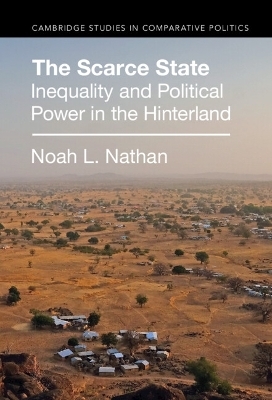
The Scarce State
Inequality and Political Power in the Hinterland
Seiten
2023
Cambridge University Press (Verlag)
978-1-009-26110-4 (ISBN)
Cambridge University Press (Verlag)
978-1-009-26110-4 (ISBN)
This book explores the politics of hinterlands in the developing world, showing that even in peripheral regions where the state appears weakest, it has significant power to transform society. The book challenges classic theories of state-building and provides lessons for policymakers promoting development in some of the world's poorest regions.
States are often minimally present in the rural periphery. Yet a limited presence does not mean a limited impact. Isolated state actions in regions where the state is otherwise scarce can have outsize, long-lasting effects on society. The Scarce State reframes our understanding of the political economy of hinterlands through a multi-method study of Northern Ghana alongside shadow cases from other world regions. Drawing on a historical natural experiment, the book shows how the contemporary economic and political elite emerged in Ghana's hinterland, linking interventions by an ostensibly weak state to new socio-economic inequality and grassroots efforts to reimagine traditional institutions. The book demonstrates how these state-generated societal changes reshaped access to political power, producing dynastic politics, clientelism, and violence. The Scarce State challenges common claims about state-building and state weakness, provides new evidence on the historical origins of inequality, and reconsiders the mechanisms linking historical institutions to contemporary politics.
States are often minimally present in the rural periphery. Yet a limited presence does not mean a limited impact. Isolated state actions in regions where the state is otherwise scarce can have outsize, long-lasting effects on society. The Scarce State reframes our understanding of the political economy of hinterlands through a multi-method study of Northern Ghana alongside shadow cases from other world regions. Drawing on a historical natural experiment, the book shows how the contemporary economic and political elite emerged in Ghana's hinterland, linking interventions by an ostensibly weak state to new socio-economic inequality and grassroots efforts to reimagine traditional institutions. The book demonstrates how these state-generated societal changes reshaped access to political power, producing dynastic politics, clientelism, and violence. The Scarce State challenges common claims about state-building and state weakness, provides new evidence on the historical origins of inequality, and reconsiders the mechanisms linking historical institutions to contemporary politics.
Noah L. Nathan is an Associate Professor of Political Science at the Massachusetts Institute of Technology. He is the author of Electoral Politics and Africa's Urban Transition: Class and Ethnicity in Ghana (2019).
Part I. Introduction: 1. The politics of state scarcity; 2. The large effects of scarce states; 3. Northern Ghana's scarce state; Part II. Societal Effects: 4. The origins of inequality; 5. Bottom-Up responses to scarcity; Part III. Political Effects: 6. Dynasties; 7. Invented chiefs and distributive politics; 8. Non-State violence as a state effect; Part IV. Extending the Argument: 9. Shadow cases; 10. The paradox of state weakness; Appendix: Qualitative interviews; Bibliography; Index.
| Erscheinungsdatum | 20.02.2023 |
|---|---|
| Reihe/Serie | Cambridge Studies in Comparative Politics |
| Zusatzinfo | Worked examples or Exercises |
| Verlagsort | Cambridge |
| Sprache | englisch |
| Maße | 156 x 232 mm |
| Gewicht | 670 g |
| Themenwelt | Sozialwissenschaften ► Politik / Verwaltung ► Staat / Verwaltung |
| Sozialwissenschaften ► Politik / Verwaltung ► Vergleichende Politikwissenschaften | |
| Wirtschaft ► Volkswirtschaftslehre ► Wirtschaftspolitik | |
| ISBN-10 | 1-009-26110-X / 100926110X |
| ISBN-13 | 978-1-009-26110-4 / 9781009261104 |
| Zustand | Neuware |
| Informationen gemäß Produktsicherheitsverordnung (GPSR) | |
| Haben Sie eine Frage zum Produkt? |
Mehr entdecken
aus dem Bereich
aus dem Bereich
Organisationen steuern, Strukturen schaffen, Prozesse gestalten
Buch | Softcover (2024)
Rehm Verlag
38,00 €


